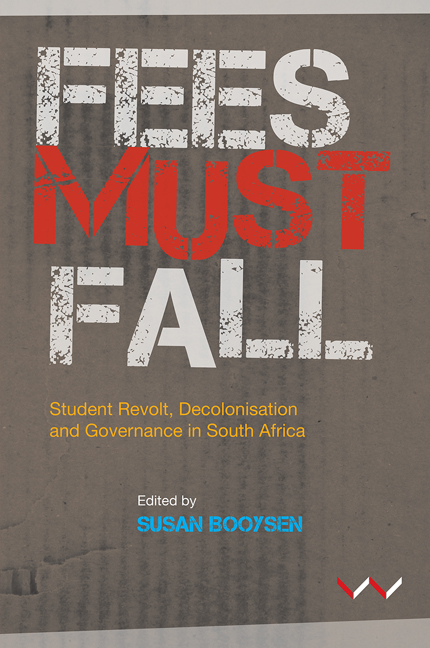Book contents
- Frontmatter
- Contents
- Acknowledgements
- Preface
- Introduction
- PART ONE POWER REDEFINED – ‘WHAT HAPPENED TO GOVERNANCE?’
- PART TWO PRIMARY VOICES – ‘THE ROOTS OF THE REVOLUTION’
- PART THREE THE REVOLT – ‘RISING AGAINST THE LIBERATORS’, SOUTH AFRICA IN AFRICA
- PART FOUR POWER AND CLASS REDEFINED – ‘SIT DOWN AND LISTEN TO US’
- PART FIVE JUSTICE, IDENTITY, FORCE AND RIGHTS – ‘WE CAME FOR THE REFUND’
- APPENDICES
- Appendix 1 Annotated timeline of the #FeesMustFall revolt 2015-2016
- Appendix 2 Student protest glossary of terms
- Appendix 3 Key features of student protest across historical periods in sub-Saharan Africa
- Appendix 4 Memorandum of understanding between the University of the Witwatersrand management, outsourced workers, and students
- Contributors
- Index
Appendix 2 - Student protest glossary of terms
from APPENDICES
Published online by Cambridge University Press: 20 April 2018
- Frontmatter
- Contents
- Acknowledgements
- Preface
- Introduction
- PART ONE POWER REDEFINED – ‘WHAT HAPPENED TO GOVERNANCE?’
- PART TWO PRIMARY VOICES – ‘THE ROOTS OF THE REVOLUTION’
- PART THREE THE REVOLT – ‘RISING AGAINST THE LIBERATORS’, SOUTH AFRICA IN AFRICA
- PART FOUR POWER AND CLASS REDEFINED – ‘SIT DOWN AND LISTEN TO US’
- PART FIVE JUSTICE, IDENTITY, FORCE AND RIGHTS – ‘WE CAME FOR THE REFUND’
- APPENDICES
- Appendix 1 Annotated timeline of the #FeesMustFall revolt 2015-2016
- Appendix 2 Student protest glossary of terms
- Appendix 3 Key features of student protest across historical periods in sub-Saharan Africa
- Appendix 4 Memorandum of understanding between the University of the Witwatersrand management, outsourced workers, and students
- Contributors
- Index
Summary
Source: Busisiwe Nxumalo (student protester). 23 October 2015. #ShutItDown…; verbatim conceptualisations from http://www.iol.co.za/news/south-africa/westerncape/ shutitdown-1934399 [accessed 24 October 2015].
Black: All racially-oppressed people of colour. This political identity goes against the divisive racial categories that were formed during apartheid, such as Indian, coloured and African. ‘Black’, as a political identity, unites all people of colour who have been socially, politically and economically oppressed.
Black feminism is a consciousness highlighting black women's experiences in society, which often go unnoticed because black women face alienation based on race, gender and other social factors. This leads to an experience only black women can speak and write about, and from which knowledge can be created.
Black pain is the dehumanisation of black people, a daily struggle that comes from the violence that exists in systems that privilege whiteness or is institutionally racist.
Decolonisation is the removal of all unjust systems such as patriarchy, racism and capitalism in society and the restructuring of society to reflect African systems.
Gender conforming people operate a system that privileges men and oppresses everyone that does not conform to the gender roles that society expects.
LGBTIAQ+ stands for lesbian, gay, bisexual, transgender/transsexual, intersex, asexual, queer and other sexual orientations and gender identities.
Patriarchy is an unjust political-social system that insists that males are inherently dominant and superior. Everyone else is deemed weak – especially females.
Violence is an experience of structural oppression. This experience can translate into physical violence, emotional and psychological violence through violent words, institutional processes, actions and behaviour that are directed at black people in order to dehumanise them. A reaction to this violence is not violence itself, but a defence against dehumanisation.
Whiteness is a system that privileges white people at the expense of black people. It is present in all institutions in South African society and it is assumed to be the standard of how things should be, but it is inherently racist.
White privilege is a set of advantages or access to certain benefits that have been exclusively developed for white people. White people have white privilege because a system of whiteness is present in South Africa and across the globe, which means that society is structured around white people and their culture.
- Type
- Chapter
- Information
- Fees Must FallStudent revolt, decolonisation and governance in South Africa, pp. 328 - 329Publisher: Wits University PressPrint publication year: 2016

